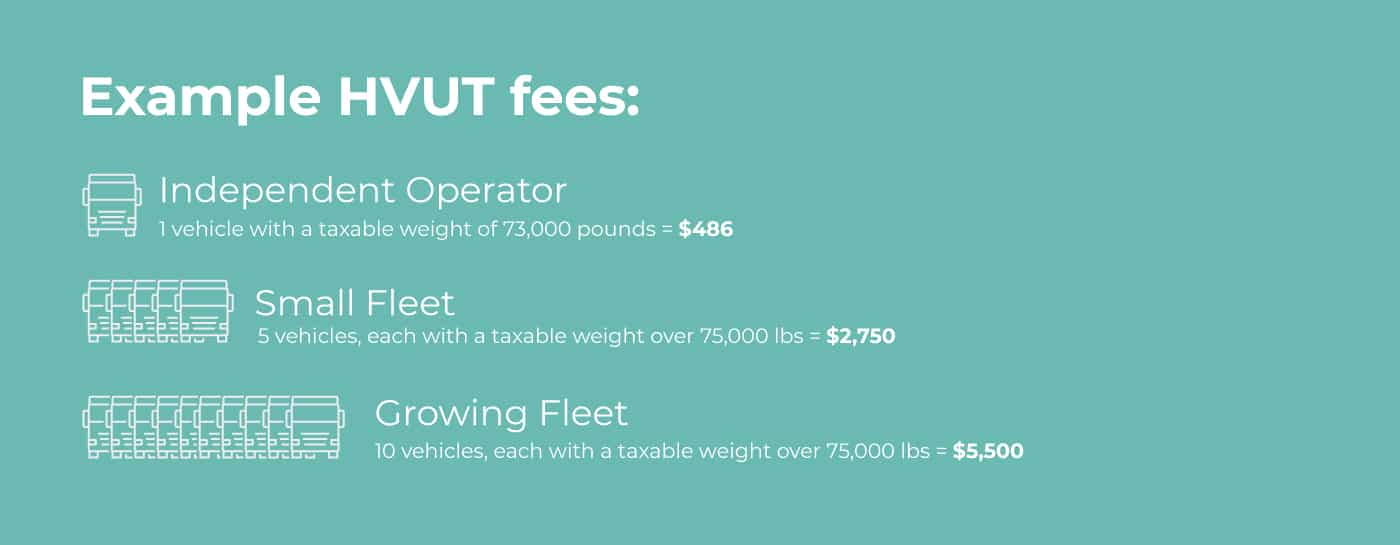Just a few short months ago your trucking company had to pay its year-end taxes – but it’s not over yet, another truck tax is looming just around the corner. The Heavy Vehicle Use Tax (HVUT) or Form 2290 is due by Aug 31st annually. Each registered motor vehicle having a gross weight equal to or exceeding 55,000 lbs. that operates on U.S. public highways is considered a taxable vehicle and must pay the 2290 cost per truck.
The HVUT is an annual tax that must be paid using Form 2290 in order to keep commercial trucks operating on public highways. To prepare for this important highway vehicle tax, it is recommended to first calculate the 2290 cost per truck for each semi-trailer rig in your operation.
How to Calculate the 2290 cost per truck
2290 costs are based on the number of taxable vehicles you operate and the gross taxable weight of each vehicle.
The gross taxable weight is determined by adding:
- the empty gross weight of the vehicle.
- the unloaded weight of any attached trailers customarily used in combination with the vehicle.
- the heaviest load customarily transported.
Calculating the 2290 cost per truck (costs are based on gross taxable weight per vehicle):
A vehicle having a registered gross vehicle weight of 55,000 lbs pays $100 using Form 2290. Additional weight over 55,000 lbs is subject to paying $22 per 1,000 lbs, up to a maximum of 75,000 lbs.
- $100 + $22 (per 1,000 lbs over 55,000 Ibs) = 2290 cost per truck
Any taxable vehicle exceeding 75,000 lbs will pay a maximum 2290 cost per truck of $550.
HVUT 2290 Due Date
HVUT payments are collected annually and are used for highway construction and maintenance. If you bring a taxable truck into operation during the current tax period (July 1, to June 30 of the following year), you must file Form 2290 by the last day of the month following the month of first use. Costs are prorated. For taxable vehicles that operated during the full filling period from July 1 to June 30, the Form 2290 must be submitted by the due date of August 31st.
How to Pay the HVUT
The easiest and preferred method is to submit Form 2290 online. Schedule 1 records all taxable vehicles used during the tax period. Whether you are a domestic freight transportation company, or an international carrier with a registered vehicle under state, District of Columbia, Canadian or Mexican law, you are required to submit Form 2290 and Schedule 1 by the August 31st deadline. Payment to the IRS can be processed by credit card or debit card.
Download instructions on how to fill out Form 2290
Visit the IRS to learn more about Form 2290 and determining the 2290 cost per truck.
If you operate a fleet of 25 vehicles or more, you are required to file HVUT 2290 and pay IRS online. For smaller operations, the IRS also encourages you to file the HVUT online, although it is not mandatory. The benefit of filing online is the ability to print your proof of tax payment rather than waiting for paper copies to arrive in the mail. For convenience and expediency, working with an authorized IRS e-file provider, such as eTruck Permits is an effective means of managing this important tax payment.
Enforcement of the HVUT
The IRS, FHWA, state and local agents work together to spot and address Heavy Vehicle Use Tax evasions. Canadian carriers crossing the border into the U.S. will most likely need to provide proof of filing to a U.S. Customs and Border Protection officer. A copy of Schedule 1, stamped and returned to you by the IRS is used for proof of payment. The penalty for late payment is 4.5% of the total HVUT tax which is due monthly for up to 5 months. If the tax filer not only fails to pay on time but also does not file on time, an additional monthly penalty of 0.5% of the total tax due is enforced. Additional interest charges of 0.54% per month accrue as well increasing the 2290 cost per truck.
Failure to pay the 2290 cost per truck, or provide proof of payment will result in heavy penalties and or suspension of vehicle registration halting operations. At that point, your business can no longer provide services on US public highways.
How to Afford Paying IRS Taxes
Many truck company owners opt to extend the time to file their yearend tax returns. Some have even deferred IRS payments by arranging tax installments using Form 9465. The HVUT offers no such extension – Form 2290 and IRS payment must be made by August 31st or you will incur heavy penalties and registration of your vehicles will be suspended. For fleets, the combined 2290 cost per truck can add up to a significant payment due. To stay on top of expenses, access to operating capital is vital, especially at this time of year when taxes are due.
Do you have the available funds to pay the 2290 cost per truck for your entire fleet? If you are like many other trucking businesses, maintaining positive cash flow is becoming even more of a challenge and meeting payments on time is increasingly difficult. Too many times the working capital you need is tied up in unpaid invoices from slow paying customers. Partnering with a reputable invoice factoring company that specialize in trucking, such as eCapital, is an easy solution to solve this problem. Freight factoring is the ideal financial strategy for your trucking company to create and maintain positive cash flow.
To ensure your trucking business is financially prepared for tax payments and operational expenses, look into the benefits of freight factoring to establish and maintain fast access to working capital. While investigating this flexible cash flow solution, be sure to explore the additional cost saving benefits of fuel cards. eCapital offers the transportation industry’s top fuel discount program with discounts at thousands of service stations nationwide. With huge savings every month on your largest operating expense, trucking companies can easily offset the cost of tax payments or any other expense to improve your bottom line.
For more information on the benefits of freight factoring and fuel cards to contribute funds towards paying the 2290 cost per truck, visit eCapital.com.
Key Takeaways
- The Heavy Vehicle Use Tax(HVUT) or Form 2290 is due by Aug 31st
- The IRS, FHWA, state and local agents work together to spot and address 2290 tax evasions. Failure to pay the 2290 cost per truck or provide proof of payment will result in heavy penalties and or suspension of vehicle registration halting operations.
- This article describes how to prepare, submit filings, and pay the HVUT.
- A funding solution is provided to ensure your trucking business is financially prepared for tax payments.
ABOUT eCapital
At eCapital, we accelerate business growth by delivering fast, flexible access to capital through cutting-edge technology and deep industry insight.
Across North America and the U.K., we’ve redefined how small and medium-sized businesses access funding—eliminating friction, speeding approvals, and empowering clients with access to the capital they need to move forward. With the capacity to fund facilities from $5 million to $250 million, we support a wide range of business needs at every stage.
With a powerful blend of innovation, scalability, and personalized service, we’re not just a funding provider, we’re a strategic partner built for what’s next.





